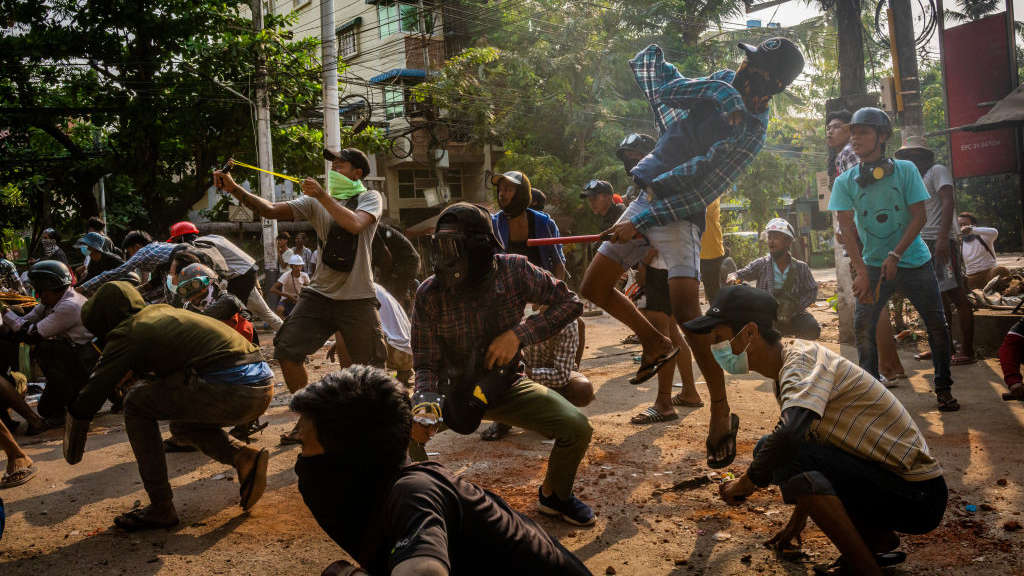Sir — The latest round of international condemnation of the Myanmar army comes with the defence chiefs of the United States of America, the United Kingdom, Japan and nine other nations denouncing the Tatmadaw in the wake of the brutal killings of over 100 civilians on the country’s Armed Forces Day (“Bloodbath”, March 30). Even as the Myanmar military chief, Min Aung Hlaing, mouthed platitudes about protecting the people and restoring democracy in the country, the armed forces continued with their ruthless repression of the protesters by firing indiscriminately at people, including children. It is ironical that the parade held last Saturday was to commemorate the start of Myanmar’s military resistance against Japanese occupation in 1945, but now the military is oppressing the citizens of its own country.
But China and Russia are yet to criticize the Tatmadaw. This could make it difficult for the United Nations security council — where both countries hold the power to veto — to take action against the junta. The military, which overthrew the democratically elected government of Aung San Suu Kyi, has killed hundreds of civilians so far and lacks legitimacy. The absence of a strong international response, thus far limited only to sanctions against the top military brass and two companies it deals with, may be worsening the situation. These incidents should draw a harsher response from the international community.
It is time that India — it was one among the eight countries that sent representatives to Myanmar on the occasion of the Armed Forces Day — forgoes its old ties with the Tatmadaw. Many people are having to flee the country. It behoves India to uphold democratic traditions and stand up for the basic human rights of the Myanmarese people.
S.S. Paul,
Nadia
Sir — It was heartbreaking to learn that India, one of the largest democracies in the world, chose to send its representatives to Myanmar for the Armed Forces Day parade. It turned out to be one of the bloodiest days in the history of the country with at least 114 civilians losing their lives. The other countries that sent their representatives to attend the event in Naypyidaw are Russia, China, Pakistan, Bangladesh, Vietnam, Laos and Thailand. Many are justifiably wondering why the Narendra Modi government chose to participate in the event rather than condemning the Myanmar military.
Perhaps it would help to remember that India’s relationship with Myanmar has been complex. During the tenures of Indira Gandhi and Rajiv Gandhi, India prioritized its commitment to democratic values but was mostly neutral in its approach towards Myanmar. However, Indian foreign policy saw a marked change in the 1990s. The government of P.V. Narasimha Rao recognized the geopolitical importance of Myanmar and took significant steps to engage with it politically while also strengthening economic ties. Subsequent governments — both the United Progressive Alliance as well as the National Democratic Alliance — continued to build India’s relationship with Myanmar.
In light of the recent developments, it is perhaps time that the Indian government rethinks its approach towards the country. We must honour our commitment to democratic traditions. On the other hand, there is no doubt that alienating Myanmar will be a problem as it is strategically positioned. The country’s growing relationships with Pakistan and China are a matter of concern as well. India must reconsider its strategies keeping these things in mind.
Bidyut Kumar Chatterjee,
Faridabad
Moment of glory
Sir — In a remarkable turn of events, ace Indian paddlers, Achanta Sharath Kamal and Manika Batra, made history by securing the Olympic berth in the mixed doubles category in table tennis after defeating the Korean pair, Sang-Su Lee and Jihee Jeon, ranked fifth in the world, at the Asian Olympic Qualification Tournament finals. The most impressive part of this encounter was the way Kamal and Batra — they are ranked 18th — turned the game in their favour after starting the match 0-2 (11-8, 11-6) down against their higher-ranked opponents. The Indian pair won six points in a row in the third game. This led to a slow but steady comeback.
While the mixed team event in table tennis is being introduced at the Olympics for the first time, the Indian duo had played against Lee and Jeon earlier and defeated them during the 2018 Asian Games. Kamal and Batra must be lauded. It is an outstanding feat in a country where cricket is the only sport accorded any importance.
C.K.R. Nathan,
Ghaziabad
Take care
Sir — A recent study found that a food preservative used to prolong the shelf life of processed food items is responsible for compromising our immune system. The chemical, tert-butylhydroquinone, was shown to have ill effects and offer no health benefit. One of the researchers pointed out that before the pandemic, chemicals that may harm the immune system did not receive sufficient attention. While it is heartening that there is now a renewed focus on public health, it is unfortunate that it took a global health crisis for experts to be alert. We must prioritize health in order to deal with future pandemics efficiently.
Aparajita Saha,
Calcutta











